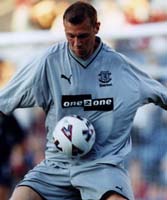ToffeeWeb Viewpoint
|
Cold hard reality 18 September, 2001
The treatment of a player whose erratic contribution to the club during the 1995 FA Cup winning season and a string of struggles against relegation was deserving of far better, but there was a large number of Evertonians who were happy to see the departure of Ferguson, a flawed hero escalated prematurely to the status of Goodison legend. The once-talismanic Scot had become a liability to the team, tempting them all too often into the long-ball game and reducing the midfield to spectators when the Blues were on the attack. That element of Everton's play was, of course, not Ferguson's fault, but he was also frustratingly immobile to the point of laziness, didn't score nearly enough goals or make enough appearances to justify his lofty status. His departure to Tyneside could only benefit Everton, both in terms of finances and on the field of play. So the latter proved. The very next game, a lively Everton attack ran out 2-1 winners at Charlton and the seeds were sown for a more fluid and enterprising Everton that was to eventually and occasionally produce moments of magic later that campaign and during the next, thanks largely to a flourishing midfield combination of Don Hutchison and Nick Barmby, the signing of Kevin Campbell in the spring of 1999 and the rise to prominence of Francis Jeffers. A year later, Campbell was injured and underwent surgery that would ensure his absence from the first few weeks of the 2000/01 season, and Everton's finances were in desperate straits despite the arrival of Bill Kenwright earlier that year. Someone somewhere, most likely Kenwright through his penchant for an emotional story, decided that it would be a good idea to bring the Big Man home from St James Park where he had made just a handful of appearances because of injury. The premise: he would act as cover for the injured Campbell, which, given Ferguson's injury-ravaged career, was madness. The fans could see the lunacy of it, the management evidently could not and it was no surprise when Ferguson was injured in only the second game of the season and Everton were stripped bare in attack. It was to be a feature of the season and Everton looked at one stage to be heading for the First Division, saved only by a late rally that ensured safety with two games left. Duncan Ferguson has proven invaluable during Everton's battles against the drop. His spirit and determination has often been the backbone of the team in times of crisis. But the 1994-95 cup run apart, when Everton have been trading blows at the right end of the footballing spectrum, Big Dunc has been found wanting. Somehow his drive disappears and he becomes a liability... which is excatly the position Everton are in now. He may have scored three goals this campaign - all of them penalties - but Ferguson has inspired a return to the one-dimensional football that plagued the latter Royle era, Kendall's third spell and the first few weeks of Smith's tenure. His lead-footed displays against the likes of Manchester United and Liverpool (normally games in which he excels) suggest that he is back to his lethargic worst, and the pitiful manner in which his teammates resorted to a barrage of up-and-under punts to his head when faced with nine-man Tottenham last month made it clear that his aerial ability provides an all-too easy escape route for the rest of the team. For the sake of Everton's development and attempts to transition from national joke to respected challengers for Europe, the difficult decision to remove Ferguson from the focal point of Everton's attack must be made. Kevin Campbell may be a shadow of the player he was when he arrived in the spring of 1999, but he has come in for stinging criticism while Ferguson has been exalted as the man who makes Everton tick. In reality, it is Campbell who has provided Ferguson with his three penalties this season as well as scoring three goals of his own. Perhaps there is resentment among the fans that Campbell's huge salary hastened the departure of Jeffers and Michael Ball, or perhaps the legend of Duncan is blinding people to the obvious, but as unpopular as this view may be, it is clear to me that a mobile Campbell-Radzinski partnership offers the best chance for Everton to get this season back on track. With a midfield as bereft of attacking ideas as Everton's, an attack force of quick, intelligent players will provide the space for telling through-balls and neat interchanges that Ferguson's static presence only serves to stifle. The example of Jeffers - an expert at pulling a defence apart - should be taken by Smith as a sign of what he must do if he cannot get the team to play to Ferguson's stengths. No one doubts Duncan Ferguson's love of Everton, but his questionable application on the field and the negativity he inspires in his team-mates mean that a bold decision has to be made regarding Everton's first choice attack. As harsh as it may sound, it necessitates Duncan warming the substitute's bench. Lyndon Lloyd
|

 November 1998. Then chairman, Peter Johnson, apparently goes behind Walter
Smith's back and sells Duncan Ferguson to Newcastle United for £8m.
We were up in arms at this latest act of deviance by the hated Agent Johnson
and the incident was enough to propel Hamperman out of Goodison Park on
a wave of fury from Smith and the supporters.
November 1998. Then chairman, Peter Johnson, apparently goes behind Walter
Smith's back and sells Duncan Ferguson to Newcastle United for £8m.
We were up in arms at this latest act of deviance by the hated Agent Johnson
and the incident was enough to propel Hamperman out of Goodison Park on
a wave of fury from Smith and the supporters.








